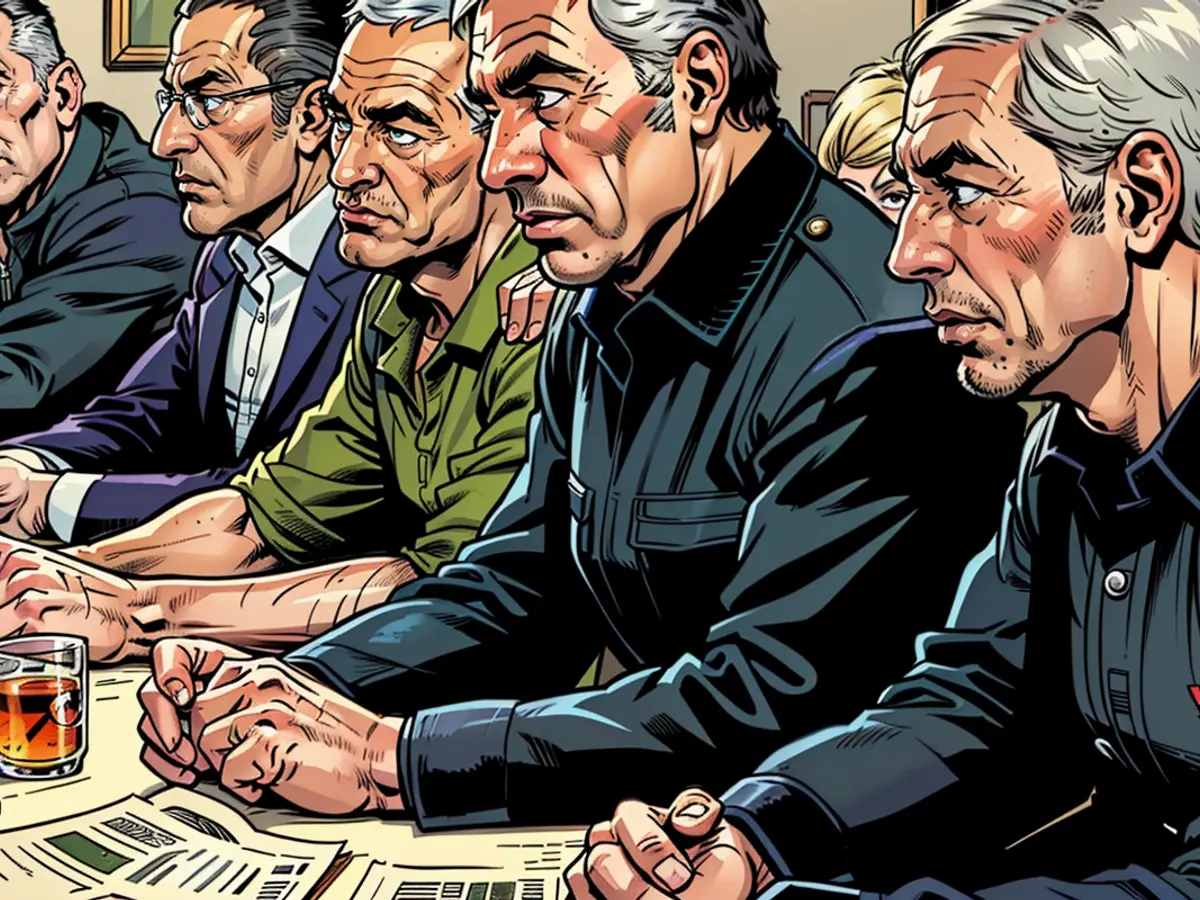- Indications of cooling tensions post-Hezbollah assault against Israel
The Middle East has seen a decrease in turbulence following the intense skirmish between the Lebanese Hezbollah militia and the Israeli military, although tensions remain high. The U.S. Department of Defense mandated the U.S. military to keep two aircraft carriers and their accompanying ships in the area. In the late evening hours, Hamas, allied with Hezbollah, launched a rocket from the southern Gaza Strip towards Tel Aviv, landing safely in unpopulated territory south of the Israeli coastal city.
Medical personnel reported an injury to a woman while she was hurriedly seeking refuge. Previous talks aimed at negotiating a truce in the Egyptian capital, Cairo, were unsuccessful. After a brief stint, the Israeli delegation vacated the city, as confirmed by airport sources. Additionally, Qatar's Emir Tamim bin Hamad Al Thani and Hamas representatives also departed Cairo. Egyptian security sources stated that there is a "difficult standoff," to the German Press Agency.
The U.S., Qatar, and Egypt are determined to attain a ceasefire and the liberation of hostages to deter any escalation in the region. They are mediating the conflict between Israel and Hamas, as both parties reject direct negotiations. Following the large-scale rocket attack by Hezbollah against Israel and the subsequent Israeli military counterattacks in Lebanon, regional military powers signaled their intention to avoid a chain reaction that could culminate in a broader conflict in the Middle East, according to the "Wall Street Journal."
Hezbollah spokesperson Hassan Nasrallah adopted a relatively subdued tone following the attack, declaring, "Our intention from the start was not to target civilians, but military objectives." While harboring harsh criticism of Israel, Nasrallah added that future attacks from Iran and the Houthi militia in Yemen on Israel would still be on the table. Hezbollah also maintained the possibility of launching further strikes. However, the reaction to the assassination of their military commander Fuad Shukr by Israel in late July appears to have cooled down for the time being, thereby providing Lebanon with a moment of respite.
In response to the early Sunday morning attack, the Israeli army claimed it had identified an "immediate danger to the citizens of the State of Israel" and retaliated by attacking numerous targets in southern Lebanon. The army claimed it had destroyed a significant number of rockets aimed at the northern part of Israel, as well as "numerous other threats." Israeli Prime Minister Benjamin Netanyahu asserted that this was not the end of the story.
Hezbollah has no desire for a full-blown conflict, asserted Danny Citrinowicz of the Institute for National Security Studies in Tel Aviv to the "Wall Street Journal." Mohanad Hage Ali, deputy director for research at the Malcolm H. Kerr Carnegie Middle East Center in Beirut, echoed this sentiment, suggesting that the limited losses on the Israeli side indicated that Hezbollah aimed to confine the conflict.
One soldier was reportedly killed in Israel, as per military reports. Media sources claimed that the young soldier was hit by falling debris from an Israeli defense missile while on board a naval vessel. In Lebanon, three individuals lost their lives.
The Houthis celebrated the "great and courageous" attack by Hezbollah. Hamas termed it a "slap in the face" to the Israeli government. The likelihood of a second wave of retaliation hinges on the outcome of the Gaza negotiations.
US Secretary of Defense Lloyd Austin reiterated Israel's right to defend itself during a phone conversation with his Israeli counterpart Joav Galant, as disclosed by the Pentagon. Simultaneously, he affirmed the United States' unwavering commitment to assist Israel in deterring threats from Iran and its regional allies.
In the evening hours, the US Chairman of the Joint Chiefs of Staff, Charles Brown, arrived in Israel. He is scheduled to meet with Israeli Chief of Staff Herzi Halevi, according to an announcement from the Israeli military. Brown's discussions will focus on security and strategic issues swayed by threats in the Middle East. The Israeli military plans to strengthen ties with US forces to bolster regional stability and cooperation between the two forces.
The US serves as Israel's most vital ally. Recent military deployments to the region, including additional warships, aircraft, and even a missile-equipped submarine, are likely to support Israel in the event of an attack by forces in Lebanon or Iran. Apart from the previously stationed aircraft carrier "USS Theodore Roosevelt," the region now hosts the aircraft carrier "USS Abraham Lincoln" and its escort ships.
Meanwhile, in an effort to avert a polio epidemic, vaccines against the disease have been delivered to the contested Gaza Strip. The Coordinator of Government Activities in the Territories (COGAT) announced that vaccines for 1.25 million people have been transported through the Kerem Shalom crossing into the coastal strip. According to the statement, international and local medical teams will administer the vaccines to previously unvaccinated children at various locations in the Gaza Strip in the coming days.
UN representatives have advocated for a ceasefire to enable polio vaccinations for hundreds of thousands of children caught in the crossfire. The Director-General of the World Health Organization (WHO), Tedros Adhanom Ghebreyesus, expressed deep concern on Friday over the case of a ten-month-old baby from Deir al-Balah in central Gaza, marking the first confirmed polio diagnosis in the Gaza Strip in 25 years. Given the high risk of infection, the Palestinian Ministry of Health, WHO, and UNICEF are preparing for two vaccination rounds in the coming weeks.
The following paragraphs shall apply to the ongoing situation in the Middle East: The U.S., Qatar, and Egypt are actively working towards achieving a ceasefire and the release of hostages to prevent any further escalation of the conflict between Israel and Hamas. This collaboration aims to mediate negotiations between the two parties, who have so far rejected direct talks.
In light of the rule that 'The following paragraphs shall apply:', it can be inferred that the subsequent discussions will focus on the international efforts to resolve the conflict and promote peace in the Middle East.








